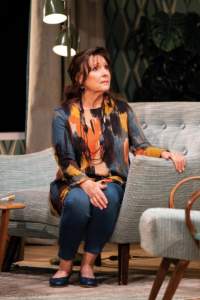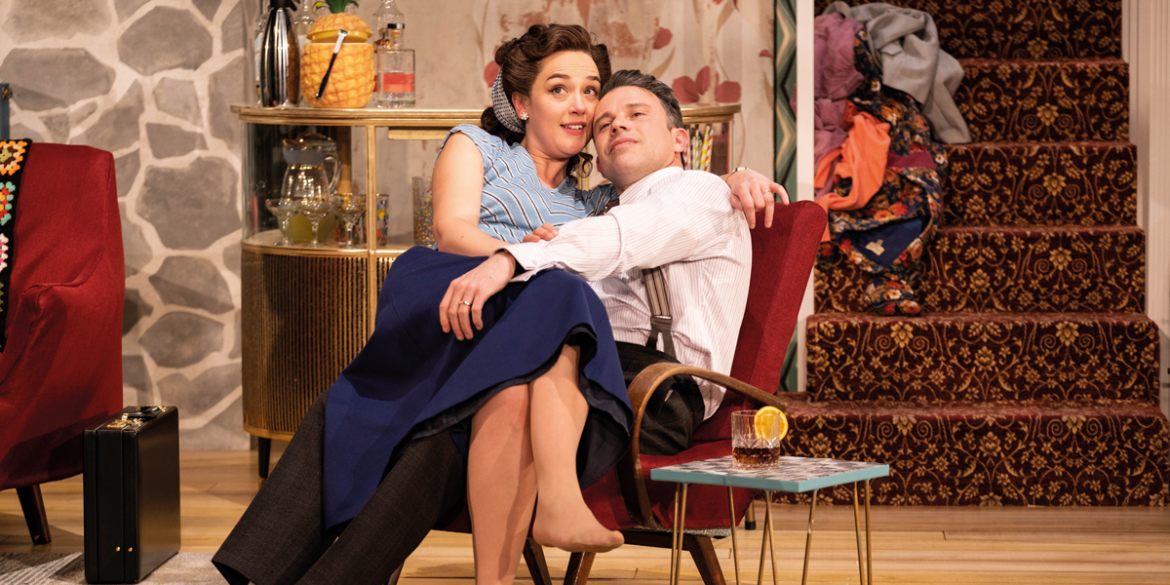Miriam Balanescu meets Jessica Ransom, as she brings a polished performance of Laura Wade’s Home, I’m Darling to the Arts Theatre this month
The best plays are undoubtedly the ones where there is more simmering below the surface than first meets the eye. Jessica Ransom, best known for providing kooky comedy in television shows such as Doc Martin or Horrible Histories (earning a Bafta for her impersonation of Mary, Queen of Scots), takes a slightly more serious turn in the Arts Theatre’s Home, I’m Darling. A contemporary play by Laura Wade about a woman who chooses the lifestyle of a 50s housewife, the cracks in Judy’s seemingly flawless life begin to show; and though the subject matter may be darker than Jessica is used to, laughs are not in short supply.
“The best comedy always comes from something truthful,” insists Jessica. “Even with Horrible Histories, you always try to find something real in those characters, whatever they take so seriously that makes them ridiculous to the rest of the world.”
Thanks to Laura’s masterful writing, this truth is not hard to find: “I buy it,” says Jessica. “With the way Laura’s written Judy, it feels like this is what Judy wants to do – and I totally see her argument.”

Diane Keen in Home, I’m Darling
Things are not as simple as they seem, though. Judy’s meddling feminist mother (Diane Keen) and husband Johnny (Neil McDermott) throw her polished life into disarray. “Judy’s mum wanted to fight for her to have the choice to do whatever she wants to do,” explains Jessica. “But Judy’s argument is: ‘I have the choice to do whatever I want to do, and that is to stay at home, make piccalilli and make my husband’s life nice.’ And if that is her choice, is that okay?”
Despite any onstage tensions, backstage the cast have been bonding over brunch on tour, with Jessica and Neil perfecting their performances. “We can feed off each other’s rhythms and kind of go: ‘That part was a bit slower tonight. Let’s try to pick it up,’” says Jessica. “You become a bit of a team when you’re on stage with someone so much.”
“I haven’t been on stage for ten years,” she adds. “By accident, rather than design, because you get into a bit of a cycle if you do telly and it leads to more telly, or do stage and it leads to more stage.” And the differences between the two? “With a play, there’s nowhere to hide.”
That has given rise to the cast’s fair share of mishaps, all of which they have had to take in their stride. “There’s a show report every night that our stage management team has to send out,” explains Jessica. “Some become epically long. For example, one night last week, somebody fell over in the wings and I had an enormous nosebleed right at the end. That was the night someone heckled us as well. It’s never predictable, but it adds to the excitement when stuff goes wrong.”
Jessica also reveals that, because of the play’s many twists and turns, audience members are often unable to keep their reactions quiet. “As everybody consumes so much TV and film, it’s rare that people are used to giving their full attention to something,” she suggests. “That’s what’s wonderful about plays… you have them more captivated.”
The crux of the play, insists Jessica, is a feminist message – for the role, she dived into research about the women of the day. “What was heartbreaking about it was that so many of them had potential – and that was stopped by the fact that the government and society were saying women should stay at home because that was your duty post-war.”
Jessica jokes, however, that she could learn a thing or two from their pristine routines. “Every day of the week is laid out. It’s like a military operation,” she laughs. “Because of being in lockdown, I think we all have a different relationship with our house as well. It’s about expectations within a relationship.”

